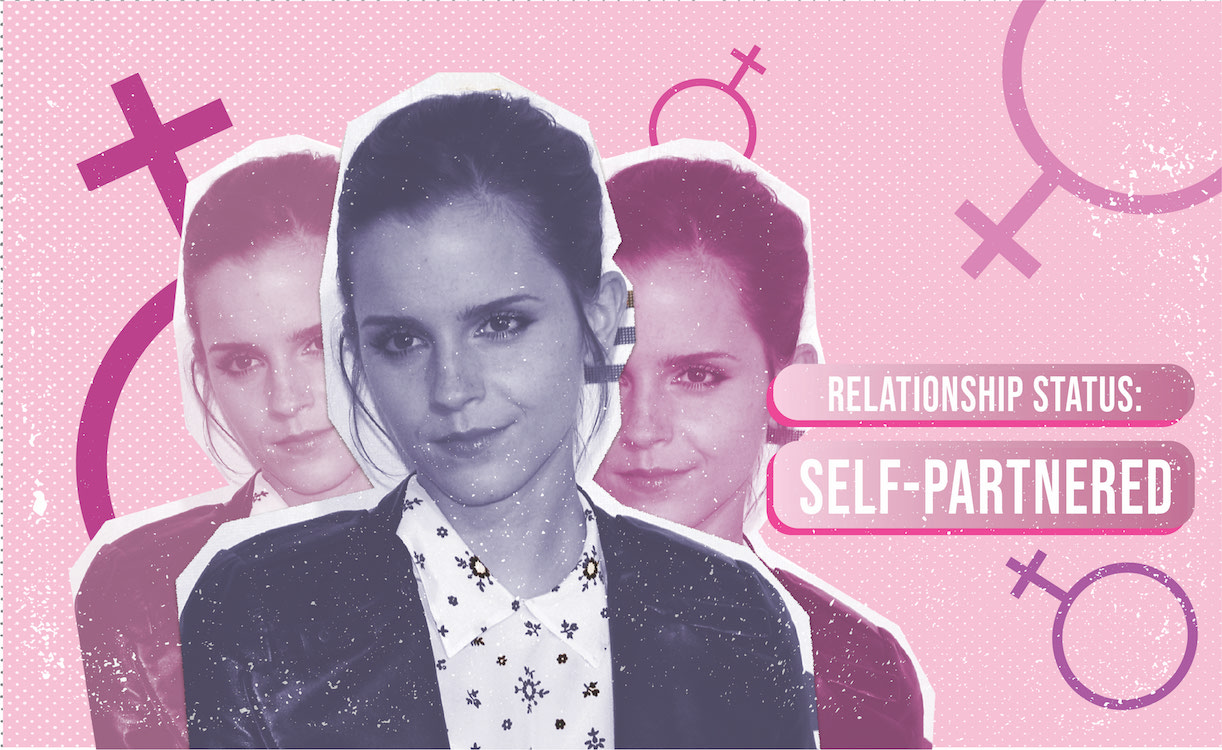Women are more than their relationship statuses

Even in recent times, it is all too common to still see that in the eyes of the public that a woman’s marital status outweighs the importance and achievements of her career. Graphic by Mikaela delos Santos
By Mackenzie Gellner, Staff Writer
If you haven’t already heard, Emma Watson was interviewed by activist Paris Lees for British Vogue in the past month. The interview was packed with heavy topics relating to feminism, transgender rights, inclusion, societal standards and anxiety around social media.
In addition, Watson also discussed her take on being single. She labeled herself as being “self-partnered,” a term she has coined to show her sense of self-love and self-acceptance of not being in a relationship.
Out of the 30-minute-long interview, “self-partnered” was plastered and emphasized throughout the media. It is ironic that although she discusses serious issues happening globally, her relationship status was the focus.
In wake of Watson’s interview, Twitter blew up with tweets for and against this term Watson generated, however, one idea stood out suggesting that no matter your successes outside of dating, you are still perceived as a failure if you are a single woman.
One tweet by Andi Zeisler, writer and co-founder of Bitch Media read, “The takeaway from this piece isn’t the term ‘self-partnered’ but the fact that you can be a BAFTA recipient, UN goodwill ambassador and beloved icon of a generation of women and people will still ask if you feel like a failure because you’re 30 and not married with kids.”
This isn’t just an issue for women in the entertainment industry, but is an expectation for all women due to gender roles and societal standards.
Gender Role Attitudes and Marriage among Young Women, by Jennifer S. Barber and William G. Axinn states, “We confine our consideration of gender role attitudes to those attitudes directly related to men’s and women’s roles within marriage: whether women should be responsible for taking care of the home and family to the exclusion of a career.”
Despite our perceived progress — due in large part to the rise of feminism — it is all too common to see that in the eyes of the public a woman’s marital status outweighs the importance and achievements of her career.
Within her interview, Watson discusses the pressures that come with turning 30 for a woman. Even being the highly successful actress and activist she is, Watson still feels pressure about being married with children by now.
“Cut to 29, and I’m like, ‘Oh my God, I feel so stressed and anxious.’ And I realise it’s because there is suddenly this bloody influx of subliminal messaging around,” she states.
“If you have not built a home, if you do not have a husband, if you do not have a baby and you are turning 30 and you’re not in some incredibly secure, stable place in your career, or you’re still guring things out … There’s just this incredible amount of anxiety.”
Even as feminism continues to push the boundaries of how society views women, there will inevitably be those voices in our head telling us we must be married with children in order to be considered a woman.
In the trailer for the upcoming film Little Women, Watson’s character, Meg, whose primary motivation is to marry and have children in contrast to her sister’s ambitions to be a writer, says that, “Just because my dreams are different than yours, doesn’t mean they’re unimportant.”
Watson explains in her Vogue interview that feminism is essentially about giving women choices. If a woman wishes to have a career, she can, but if she wishes to be a housewife, that’s acceptable too.
This shows how we have the power and ability to direct our own narratives, no matter where they lead us and even if they do not match the ideals of living.



